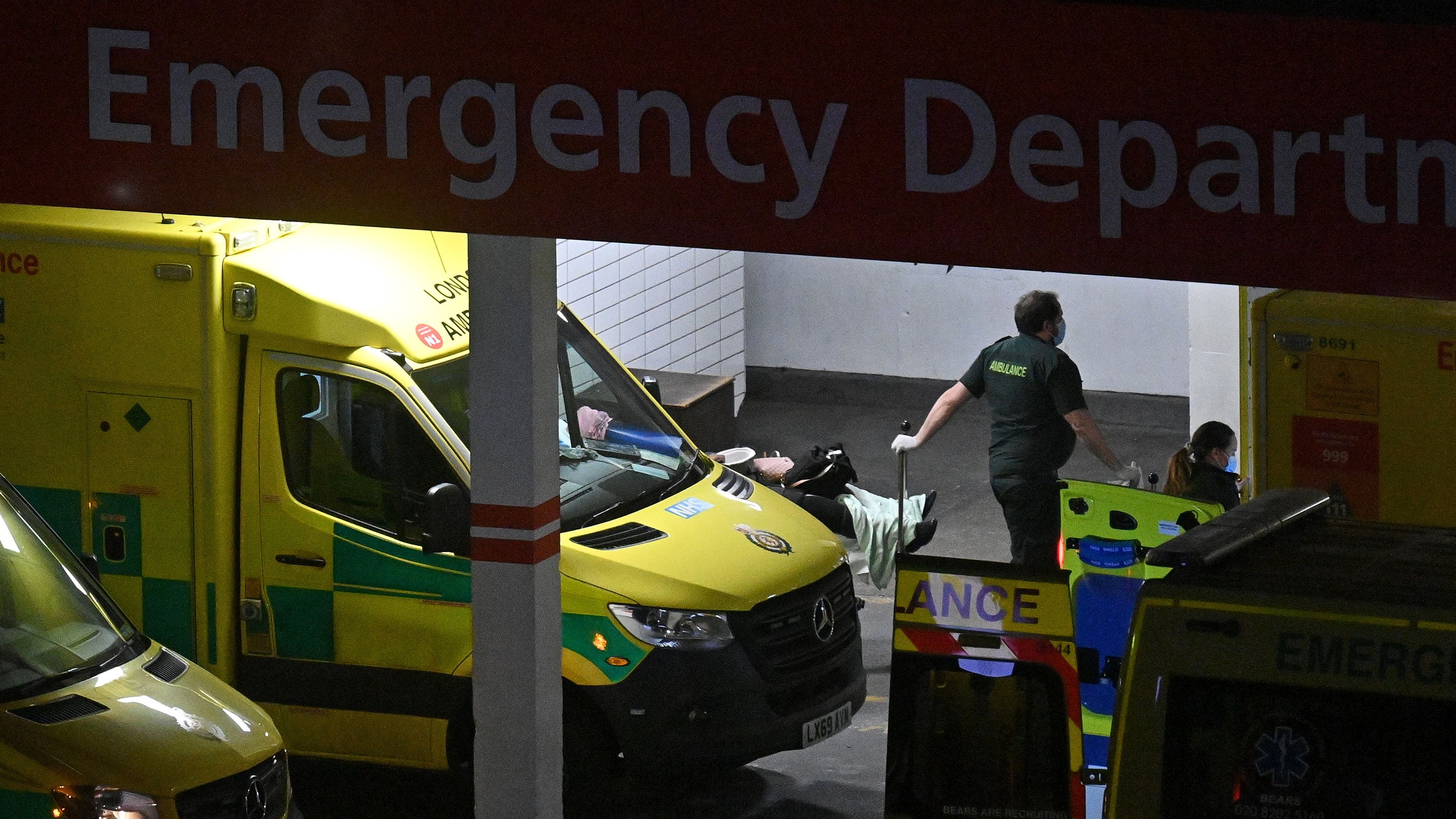Coronavirus: will crisis in NHS hospitals trigger lockdown tightening?
Covid patients occupying 30,000 beds as government scrambles to stem rate of infections

A free daily email with the biggest news stories of the day – and the best features from TheWeek.com
You are now subscribed
Your newsletter sign-up was successful
The government is considering stronger lockdown measures in a bid to prevent NHS hospitals from becoming overwhelmed with Covid-19 patients.
A total of 30,758 people were receiving treatment in hospitals across the country yesterday, up from 29,462 the previous day, according to official data. And the number of critically ill patients requiring mechanical ventilation beds has almost doubled since 27 December to just under 3,000.
Documents seen by the BBC reveal that Southend Hospital has “had to reduce the amount of oxygen it uses to treat patients” as a result of shortages. The Guardian reports that Barts Health NHS trust in London has started cancelling surgery for patients with advanced cancer.
The Week
Escape your echo chamber. Get the facts behind the news, plus analysis from multiple perspectives.

Sign up for The Week's Free Newsletters
From our morning news briefing to a weekly Good News Newsletter, get the best of The Week delivered directly to your inbox.
From our morning news briefing to a weekly Good News Newsletter, get the best of The Week delivered directly to your inbox.
Meanwhile, around 170 bodies are being kept in a “pop-up morgue” in Surrey, HuffPost says, after the county’s hospital mortuaries reached capacity amid a rapid rise in Covid-related deaths.
‘Nothing we have seen before’
Bed occupancy for patients suffering from Covid-19 fell to a low of 451 in early September, but has been rising steadily since 9 December, when 13,467 people were hospitalised, government figures show.
London continues to be the worst-hit area in the country, with 7,494 people currently in hospital. The Southeast has also been badly impacted by the new variant of the virus, with a total of 5,373 hospitalised patients in the region.
A free daily email with the biggest news stories of the day – and the best features from TheWeek.com
The government is today rolling out its “Vaccine Delivery Plan”, with the goal of inoculating at least 13 million people by mid-February. But as Politico London Playbook’s Alex Wickham notes, “any positive vaccine news could quickly become overrun by the alarming situation in Britain’s hospitals”.
Government officials admit the crisis “is likely over the next three weeks to become like nothing we have seen before”, he continues. “A government official tells Playbook that on current projections deaths are likely to approach a peak of close to 2,000 per day.”
That grim message is underlined by The Times, which reports that Boris Johnson last night told the cabinet that challenge facing the NHS was “parlous and perilous”.
“Downing Street fears that hospitals will soon be overwhelmed if compliance does not improve,” the paper adds.
Compliance chaos
A new public awareness campaign was launched over the weekend calling for people to “stay at home”, in a bid to bolster public compliance with lockdown rules. The campaign is being fronted by England’s Chief Medical Officer Chris Whitty, who warns that “the new variant, is spreading quickly across the country”.
Appearing on BBC Breakfast today, Whitty urged members of the UK public people to “minimise” the time they spend outside of their homes, adding: “I think everybody accepts that this is the most dangerous time we’ve really had in terms of numbers into the NHS at this point in time.”
He continued: “Vaccines give clear hope for the future, but for now we must all stay home, protect the NHS and save lives.”
The campaign launch has been triggered by “growing fears that people have not been observing social distancing rules”, says Sky News.
Ministers last night agreed to “toughen enforcement of the rules”, with a focus on retail outlets, The Times reports. A government source told that paper that supermarkets may be made legally responsible for enforcing mask wearing and social distancing, after a Public Health England study of track-and-trace data found that the stores were the most common site of exposure to the coronavirus.
“We’ll be looking at whether all the right protections are in place - including ensuring social distancing is being followed, that one-way operations are in place, that there are limits on the number of people in stores at one time and that all customers are wearing masks,” the source said.
A second government source added that the exemption in the rules that allows people to go out for exercise once a day is also under scrutiny, amid fears that it is being “misused”.
Home Secretary Priti Patel and Communities Secretary Robert Jenrick have been asked to “put pressure on police and local authorities respectively to do more to drive home the message”, The Times adds.
The government has cross-bench support for tightening the existing restrictions, after Keir Starmer yesterday told the BBC’s The Andrew Marr Show that the current measures “may not be tough enough”.
The Labour leader - who last week faced scrutiny over the timing of his call to close schools - added that rules allowing nurseries to remain open may need to be reassessed.
“Quite a lot of people are surprised that primary schools are closed and that nurseries aren’t closed,” he said.
Joe Evans is the world news editor at TheWeek.co.uk. He joined the team in 2019 and held roles including deputy news editor and acting news editor before moving into his current position in early 2021. He is a regular panellist on The Week Unwrapped podcast, discussing politics and foreign affairs.
Before joining The Week, he worked as a freelance journalist covering the UK and Ireland for German newspapers and magazines. A series of features on Brexit and the Irish border got him nominated for the Hostwriter Prize in 2019. Prior to settling down in London, he lived and worked in Cambodia, where he ran communications for a non-governmental organisation and worked as a journalist covering Southeast Asia. He has a master’s degree in journalism from City, University of London, and before that studied English Literature at the University of Manchester.
-
 Crisis in Cuba: a ‘golden opportunity’ for Washington?
Crisis in Cuba: a ‘golden opportunity’ for Washington?Talking Point The Trump administration is applying the pressure, and with Latin America swinging to the right, Havana is becoming more ‘politically isolated’
-
 5 thoroughly redacted cartoons about Pam Bondi protecting predators
5 thoroughly redacted cartoons about Pam Bondi protecting predatorsCartoons Artists take on the real victim, types of protection, and more
-
 Palestine Action and the trouble with defining terrorism
Palestine Action and the trouble with defining terrorismIn the Spotlight The issues with proscribing the group ‘became apparent as soon as the police began putting it into practice’
-
 A Nipah virus outbreak in India has brought back Covid-era surveillance
A Nipah virus outbreak in India has brought back Covid-era surveillanceUnder the radar The disease can spread through animals and humans
-
 Is the US about to lose its measles elimination status?
Is the US about to lose its measles elimination status?Today's Big Question Cases are skyrocketing
-
 A real head scratcher: how scabies returned to the UK
A real head scratcher: how scabies returned to the UKThe Explainer The ‘Victorian-era’ condition is on the rise in the UK, and experts aren’t sure why
-
 How dangerous is the ‘K’ strain super-flu?
How dangerous is the ‘K’ strain super-flu?The Explainer Surge in cases of new variant H3N2 flu in UK and around the world
-
 Covid-19 mRNA vaccines could help fight cancer
Covid-19 mRNA vaccines could help fight cancerUnder the radar They boost the immune system
-
 The ‘menopause gold rush’
The ‘menopause gold rush’Under the Radar Women vulnerable to misinformation and marketing of ‘unregulated’ products
-
 Is this the end of ultraprocessed foods?
Is this the end of ultraprocessed foods?Today's Big Question California law and the MAHA movement are on the same track
-
 Can TrumpRx really lower drug prices?
Can TrumpRx really lower drug prices?Today’s Big Question Pfizer’s deal with Trump sent drugmaker stocks higher